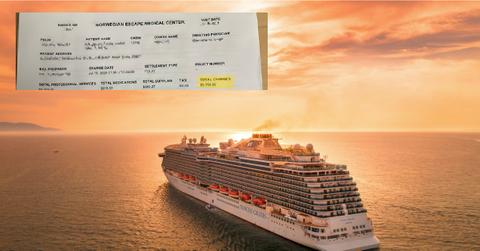"Don’t Get Sick on a Cruise Ship" — Passenger Hit With Shocking $10,000 Bill
The medical bill included a "New Patients" charge of $199.
Published Aug. 4 2025, 3:50 p.m. ET
A viral Reddit post uploaded a healthcare services bill breakdown that delineates the cost of getting sick on a cruise ship. Which may have you rethinking reaching for that pre-shelled shrimp in a liner's mess hall, or if that voucher for an ocean getaway is worth it.
A user on the app, @ultranothing, shared a photo of one such bill on the social media website's r/mildlyinfuriating sub.
The sheet of paper breaks down a series of expenditures given to a passenger by the Norwegian Escape Medical Center, which were issued on July 18, 2025.

The total charges amounted to a whopping $9,759.85, minus any applicable taxes, which the receipt indicates weren't applied to the cost of medical care.
The thorough breakdown reveals that the bulk of the costs were rooted in "total professional services," which totaled $8,761.
The ill passenger spent $618.59 on medications and $380.27 on treatment supplies. Beneath the itemized receipt was a "New Patients" charge of $199, which seems to have been incurred because the patient visited the medical facility during "non-posting hours."
Then there were several other tests: urinalysis, CG8 Plus, Piccolo tests, observations, blood extractions, IV injections, i-stat tests, and SARS/COVID testing.
At the bottom of the page, the receipt reads that this was only one of four, intimating that the passenger was slapped with a slew of other charges.
Several folks who replied to the story shared their own anecdotes regarding cruise ship injuries, with many of the tales serving as a cautionary tale urging travelers to always opt for on-board health insurance.
One person penned, "My friend’s mom slipped and fell and broke her back in the bathroom on her Alaskan cruise. She was in her 60s but great health otherwise. Had to be airlifted to a hospital. Definitely was worth it to have the insurance."
Another replied that their mother also sustained an injury while boarding a cruise ship. Because she opted to fork over for insurance premiums, she wasn't stuck paying an astronomical bill. "Woah. My mom just fell in Iceland (about to board her cruise ship) and broke her ankle, and needed surgery. Thank god she had insurance. She needed first-class seats to come home to CA, and the hospital bill was $36k."
Another Reddit user said that insurance costs to coverage ratios were quite high. "Always get health insurance when traveling. I paid like $50 and was covered for a week up to $5 million. More than my car insurance covers," they penned.
Large vessel travel-centric blog Cruiseline also offered some helpful information for folks who want to take to the seas but are curious about how health insurance plans work. First, the outlet recommends that folks who already have health insurance coverage review their policy information to see if they're covered in the event of requiring healthcare outside their country of residence.
Knowing if any additional premiums are required in these instances is also helpful, and if there's a possibility of adding on extra coverage for the duration that you'll be traveling.
Furthermore, travelers should find out the limitations of the onboard medical facilities on a cruise ship.
As some of the Redditors mentioned in response to @ultranothing's post, more serious conditions could require being airlifted. These expenditures can range anywhere from $40,000 to $150,000 depending on the area.
So double-check your coverage maximums to ensure that if you do need to be airlifted, that this is covered under your insurance premiums. Also, double-check to make sure airlift travel falls under that coverage umbrella, too.
Cruiseline also recommends pairing travel insurance with travel medical insurance, stating that many companies actually offer a comprehensive package. Moreover, note the areas that you'll be visiting, and ensure that whatever plan you get applies to those regions, and any of the activities you might be engaging in.
I.e., if you're planning on chilling at a resort in the Caribbean, the biggest threat to your health might be food or water-borne bacteria. But if you're going to be speeding around in a jet-ski, cave diving, rock climbing, or racing ostriches, then you'll probably want to make sure that whatever potential personal injury coverage you have for these endeavors is considered.
Additionally, there are plenty of health experts who offer up preventative measures travelers can practice whilst traveling. After all, insurance is there just in case you get sick, and you don't want your vacation ruined by falling ill because you didn't practice good hygiene.
Which doctors The New York Post consulted with said is probably the best way to curb illnesses while aboard cruise ships. Due to the small, enclosed nature of vessels, airborne pathogens can spread quickly. Frequently washing your hands and wiping down/disinfecting surfaces is a good way to mitigate your chances of getting sick.
Moreover, avoiding particular foods on the buffet line can also keep you from spending your entire holiday on the toilet. If you witness people grabbing from "communal plates" with your hands, maybe abstain from eating whatever foods are on that plate.
Also, getting up to date on your immunizations or being cognizant of the types of viruses that are endemic to the areas you're docking are a good idea.
